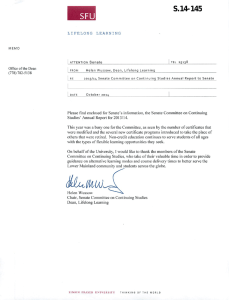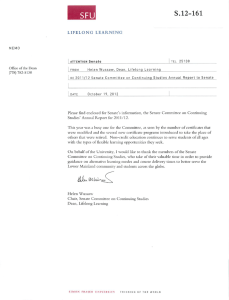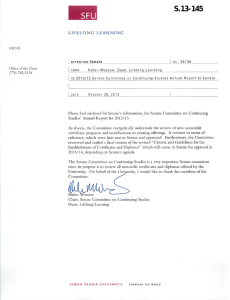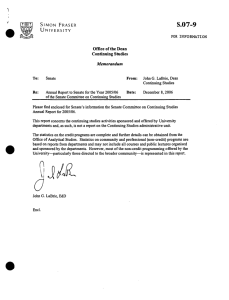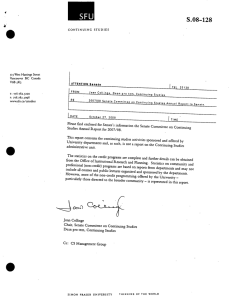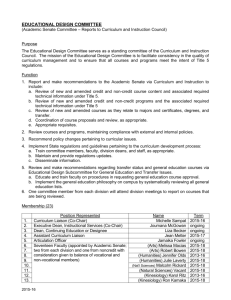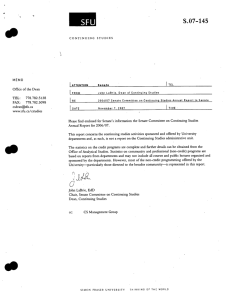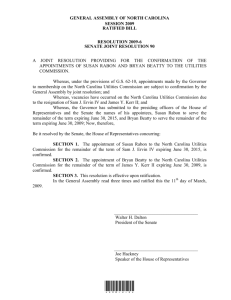Document 10574826
advertisement
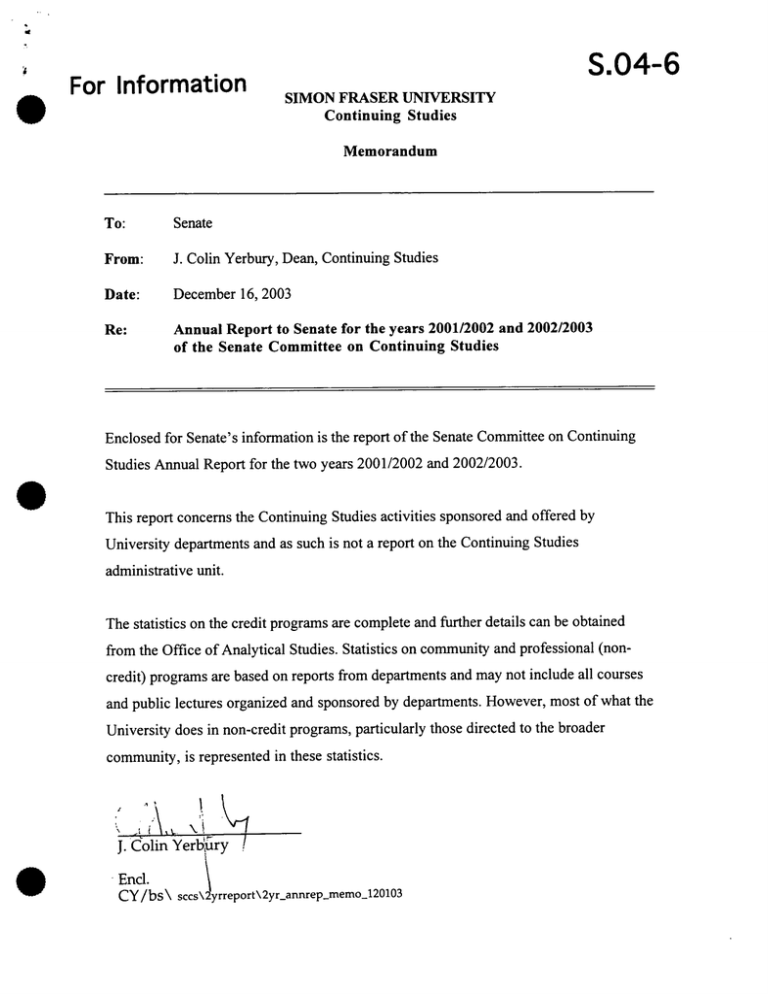
For Information . S.04-6 SIMON FRASER UNIVERSITY Continuing Studies Memorandum To: Senate From: J. Cohn Yerbury, Dean, Continuing Studies Date: December 16, 2003 Re: Annual Report to Senate for the years 2001/2002 and 2002/2003 of the Senate Committee on Continuing Studies Enclosed for Senate's information is the report of the Senate Committee on Continuing Studies Annual Report for the two years 2001/2002 and 2002/2003. This report concerns the Continuing Studies activities sponsored and offered by University departments and as such is not a report on the Continuing Studies administrative unit. The statistics on the credit programs are complete and further details can be obtained from the Office of Analytical Studies. Statistics on community and professional (noncredit) programs are based on reports from departments and may not include all courses and public lectures organized and sponsored by departments. However, most of what the University does in non-credit programs, particularly those directed to the broader community, is represented in these statistics. J . Cohn Yerbury • End. CY lbs \ sccs\2yrreport\2yr_annrep_memo_120103 Simon Fraser University Senate Committee on Continuing Studies Annual Reports to Senate For the years 2001/2002 and 2002/2003 • Composition and Mandate The current membership of the SCCS is the Dean (chair), Librarian, four faculty members, two at-large members, one lay member and one student (see Appendix A). The SCCS normally meets twice each year, once during the fall semester, and once during the spring. SCCS is responsible to Senate for policy with respect to the overall development of the University's continuing education credit and non-credit programs. The Committee also reviews at regular intervals existing and proposed non-credit programs; develops procedures for the approval of various categories of credit-free instruction; and receives for consideration and approval programs proposed as suitable for non-credit certificate granting status. The SCCS reports at least once annually to Senate. Actions of the SCCS S 2001-2002 The SCCS met in November 2001 and in May 2002, at which times the following non-credit certificate programs were approved: • Internet Business Analysis • IT Project Management • Dweb • University Teaching and Learning • English Language and Culture • Urban Design 2002-2003: The SCCS met in November 2002 and in May 2003, at which times the following non-credit certificate programs were approved: • Executive Management Development Program • Liberal Arts - Seniors Program • Management Skills in Advanced Technology • Dialogic Language and Culture Teaching • Comparative Language and Culture • Aboriginal Tourism, Eco-tourism and Small Business S The SCCS has been reviewing the "Criteria and Guidelines for the Establishment of Certificates for Successful Completion of Programs of Non-degree Courses" (approved by Senate, November 27, 1989) and will be forwarding proposed revisions to Senate in the fall of 2003. Course Offerings and Enrolments Credit programs: The Centre for Integrated and Credit Studies (CICS) in Continuing Studies is primarily responsible for administering, at Harbour Centre, credit courses that support the efforts of part-time students to complete a certificate, diploma, or minor program in a number of fields. Courses are planned in coordination with the Faculties/schools/departments and funded by special stipends. The CICS is also responsible for the Integrated Studies cohort-based degree completion programs leading to the BGS, and for the Seniors Program. There was an increase (7.8 1%) in the number of courses offered (from 192 in 2001-2002 to 207 in 2002-2003). There was also an increase in the enrollment (9.95%) and FTE's (10.92%). See Appendix B for details. Distance education: The Centre for Distance Education is responsible for working in partnership with academic units to develop and deliver courses for students who require or prefer an alternative to on-campus study. Increasingly, this involves the inclusion of online opportunities for teaching and learning. The Centre is committed to the pedagogically sound use of technology and works with faculty members to ensure that their particular approach to teaching is captured in the distance and online mode. CDE continues to work with academic departments and faculty in the development of online courses. Program areas receiving special attention include Kinesiology, Gerontology, Communication, Criminology, and the Technical Writing Program. See Appendix B for details including figures for online course components. Non-credit certificate programs: The Senate Committee on Continuing Studies has approved 12 non-credit certificate programs since 2001. Representing a broad variety of disciplines, these programs provide students with opportunities to complete specialized programs and receive certificates in recognition of their work. Developed in association with university faculty members and professional organizations, the quality of the non-credit certificate programs is assured through review by academic program advisory committees and an established evaluative process. Frequently spawning new, complementary short courses, workshops and seminars, the noncredit certificate programs demonstrate Continuing Studies' commitment to facilitating and fostering academic and community partnerships in the development of new programs. Registrations in non-credit certificate programs represent approximately 33% of Continuing Studies registrations. See Appendix B for details of non-credit certificate program registrations. Senate Committee on Continuing Studies-Approved Non-Credit Certificate Program Descriptions Internet Business Analysis Approved in May 2002, this program was tailored to focus on the knowledge and skills needed for the business analysis of corporate intranets. While offered only once onsite at BC Gas 2 bs/sccs/Annual Report 050603 0 corporate headquarters in Burnaby, BC, this certificate program has subsequently spawned the development of a number of individual courses, workshops, and seminars, which have been well attended. IT Project Management Initially proposed by Applied Sciences and the Faculty of Business, this program was offered once in the fall of 2001. It has not been run subsequently due to downturns in the technology sector. The program is currently under review. Dweb Approved in May 2002, first offered jointly in 2003 through the Learning and Instructional Development Centre and TELEStraining as the Certificate in Web-Based Instruction, this program is designed to provide instructors with the expertise to design, develop and deliver fully online course offerings. University Teaching and Learning Approved in November 2001 and offered to graduate students through the Learning and Instructional Development Centre, the Certificate in University Teaching and Learning for Graduate Students integrates learning and instructional theory with the individual's knowledge of their subject discipline to effect teaching practice, emphasizing a scholarly approach to teaching. 0 English Language and Canadian Culture This highly successful program, approved in November 2001, teaches participants to communicate effectively by building reading, writing, listening and speaking skills while gaining a working knowledge of the Canadian cultural context. Urban Design Approved in November 2001, taught by leading urban design professionals and encouraging interdisciplinary discussion on current western Canadian urban design issues, this program draws on the expertise of architects, landscape architects, planners, engineers, economists, sociologists, real estate professionals, lawyers, and the collective knowledge and experiences of the public. Executive Management Development Program This program was designed for current and future managers who want to develop their professional skills and master the concepts and techniques needed to excel in business. Liberal Arts - Senior Program "You don't stop learning when you grow old ... You grow old when you stop learning!" • Students in this program, which was approved in November 2002, complete at least eight noncredit Seniors Program courses by attending scheduled classes and writing an academic paper in response to the topic presented. bs/sccs/Annual Report 050603 Management Skills in Advanced Technology This professional development program, approved in November 2002, covers the essential skills and knowledge required of managers in technically-oriented businesses including the principles of human and organizational behaviour, resource allocation, demand forecasting, economic and financial analysis, project management, sales and marketing, eBusiness strategies, operations, business planning, writing and public speaking. Dialogic Language and Culture Teaching This communication-based approach to language and culture learning emphasizes inquiry and ongoing learning while it explores the relationship between models of language and models of culture. Founded in the belief that language learning is often understood to be separate from the context in which language is used, this program employs a dialogic communicative methodology that recognizes both the instructor and the learners, and enables participants to develop an understanding of the relationship between language and culture. Approved in November 2002, this program is scheduled to begin registering students in spring 2004. Comparative Language and Culture Developed in partnership with the David See-Chai Lam Centre for International Communication, this program provides an opportunity for prospective university students and immigrant professionals to develop cross-cultural communication skills as they increase their knowledge of the Canadian cultural context and begin to examine the underlying assumptions of their native language and culture. Approved in November 2002, this program is scheduled to begin registering students in spring 2004. Aboriginal Tourism, Eco-tourism and Small Business Intended for delivery in partnership with the Chief Dan George Centre for Advanced Education, classes for these certificate programs will be housed in the newly renovated space in the Cathedral Place building in downtown Vancouver. Approved in November 2002, these programs are scheduled to begin registering students in fall 2003. bs/sccs/Aririval Report 050603 S S APPENDIX A Senate Committee on Continuing Studies, 2001 - 2002 Members Cohn Yerbury, Chair Lynn Copeland, Library Stella Atkins, Computing Science Muneer Esmail, Student Alternate Margaret Jackson, Criminology Sarah Klymson, Student Gary Mauser, Business Administration James McArthur, Lay Member Jan Van Aalst, Education Larry Weldon, Mathematics and Statistics Faculty Member, (vacant) 2 Year term expiring May 31, 2003 2 Year term expiring May 31, 2002 2 Year term expiring May 31, 2002 2 Year term expiring May 31, 2003 2 Year term expiring May 31, 2002 2 Year term expiring May 31, 2003 2 Year term expiring May 31, 2003 2 Year term expiring May 31, 2002 Senate Committee on Continuing Studies, 2002 - 2003 Members . 0 Cohn Yerbury, Chair Lynn Copeland, Library Stella Atkins, Computing Science Muneer Esmail, Student Alternate Robert Gordon, Criminology Margaret Jackson, Criminology Joel Warren, Student Gary Mauser, Business Administration James McArthur, Lay Member Jan Van Aalst, Education Larry Weldon, Mathematics and Statistics 2 Year term expiring May 31, 2003 2 Year term expiring May 31, 2004 2 Year term expiring May 31, 2004 2 Year term expiring May 31, 2004 2 Year term expiring May 31, 2004 2 Year term expiring May 31, 2004 2 Year term expiring May 31, 2003 2 Year term expiring May 31, 2003 2 Year term expiring May 31, 2004 LLI I- \0C © C r- en v —C4 00 Q\ en *r CS en 0 Nen — i C °° — r — C en 00 00 N N C ir 00 'f — O\ 00 S- E 0 C#D • "0 — 00 C\ 00 O4- NC — 0 z0 .O C r'i en c1'•,r': — 00 0 en 'C N N en ren N en 00 CCCCCC CNC C '.0 0 en 'r 00 — en en'.O— C c)z (ID N — NN 0 —en — 00 0 CZQ0 — 00 en — N 0" ICT N 0' lID IP C en en N en e' en C -- 00 en — En '.0 't — C - 5— C N N N 0 c,4 '.en M en en • E 00 00 en — N 000 0 z ri — t N en N en — 00 W to to z 0 cd • c# C/• —)4.4 C _ 0 Ll qtT CN 00 'rO qtt r4 kn C,) E o —r-— —oo© rs_ C\ a QO tn C,) N —a\s ) 2 • 00 cIi N - oo_ - ON en M z UCl) . -c'1c 'rm 1 00 z ocr 0 —oc_ "-C z c-) rC'I 'r000\ oor- UCl) N .. - 0 LS E co s. 0 0N C,) S U C) CA cts 0.o cl o - '.0 N n rNr1NN rfl E V . . . O to V V tO OU VV oo0 0000 O00 0 N - 'i O' NN r'1ON'f V &V o ri z U C U V 0 0 r. C L) z V C z 0 - V• V .- L) E 'E<VQ tu I V. VQN L rc# nH
